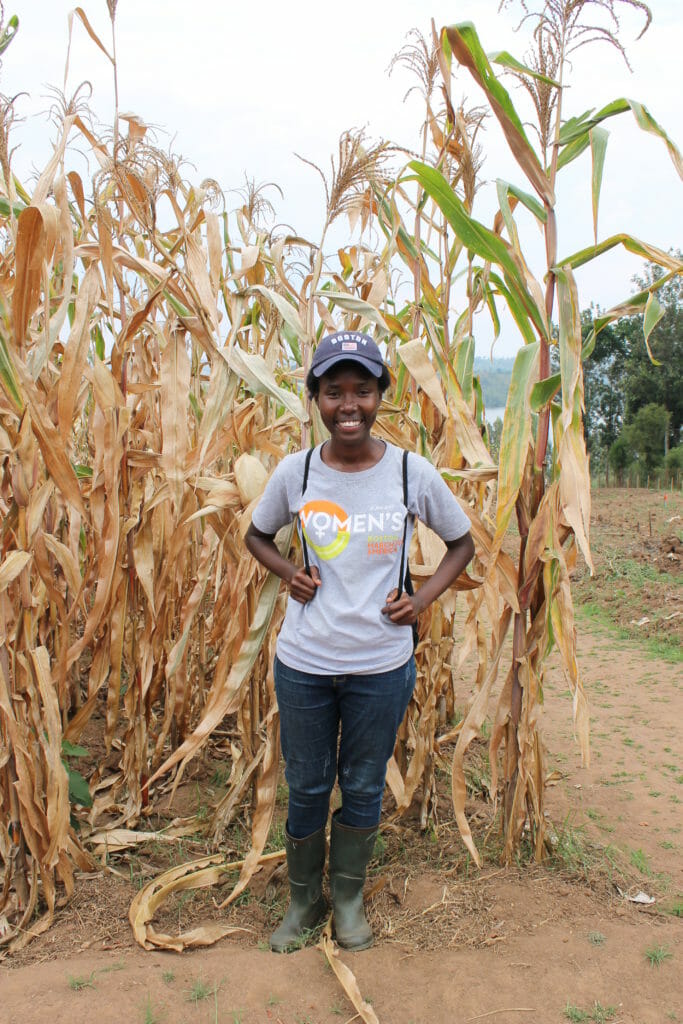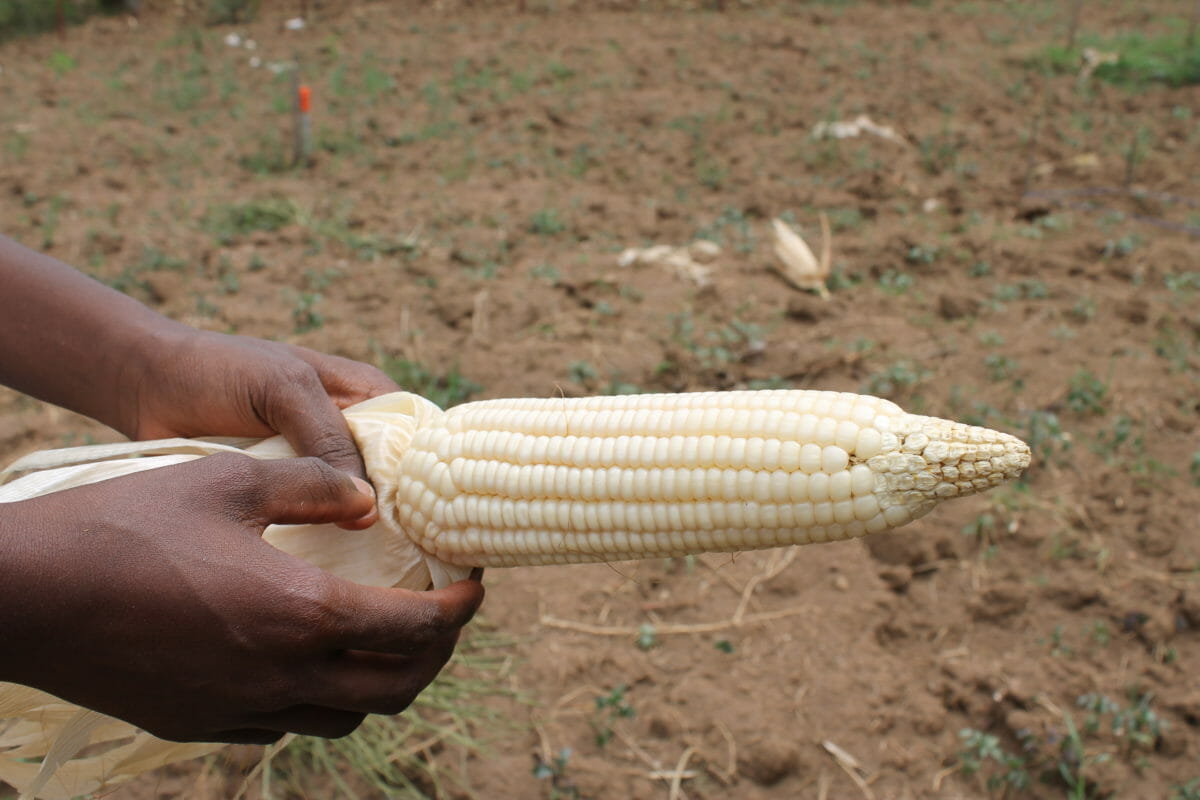A Small Rwandan Farm Looks to Solve a Big Problem
Nova Farm wants to provide a solution to a crucial issue across Africa: protein deficiency.
A Small Rwandan Farm Looks to Solve a Big Problem
Nova Farm wants to provide a solution to a crucial issue across Africa: protein deficiency.

Rosine Ndayishimiye stands in a field at Nova Farm.by Patrick Commins
The field of soaring cornstalks and abundant ears looks more like Iowa than the dry Kayonza Province in eastern Rwanda. Just a few yards away, widely spaced plants that are barely more than three feet tall are more typical of local farmers’ fields. The dramatic difference points to a solution to a crucial problem in Rwanda and across Africa: protein deficiency.
On the tiny 15-acre Nova Farm, the fertile cornfield is a pilot project for teaching local farmers agricultural practices such as no-till planting, soil conservation to prevent erosion, crop rotation, and farm management. By increasing crop yields in maize (corn) and encouraging more farmers to plant soybeans, the project’s goal is to locally source grains for animal feed. That, in turn, increases the supply and lowers the cost of meat, which some poorer Rwandans eat only once a year. More affordable protein means better diets and less stunted growth in children.
“It’s all very connected, from the work we do here on the farm up the chain,” says Rosine Ndayishimiye, manager of Nova Farm operated by Bridge2Rwanda, a US-based NGO.
Gerardine Mukeshimana, Rwanda’s Minister of Agriculture and Animal Resources, stresses the importance of an evolving agriculture sector to provide better food security, increase export crops beyond coffee and tea, and create jobs. “Some farmers are starting to see agriculture as a business. They think in terms of making money by selling milk, or how much they can make by selling crops like onions or tomatoes,” she says.
Rwanda, which is the size of Maryland, is the second most densely populated country in Africa, raising the stakes for sustainably increasing the productivity of the land tilled by the country’s mostly subsistence farmers, who account for about 70 percent of the population. Ndayishimiye says her organization tries to do everything it can to tailor its projects to the average Rwandan farmer.

Seeing Is Believing
Some farmers look at Nova Farm’s fields with disbelief. Others who work at or have been trained by Nova Farm are starting to adopt better practices.
One of the biggest challenges at Nova Farm is convincing farmers to grow soybeans to supply a ready and growing market such as Zamura Feeds, an animal feed mill established in Rwanda by Donnie Smith, the former CEO of Tyson Foods. But with the average farm plot measuring less than half a hectare, farmers don’t want to grow what they and their families can’t eat.
It also takes some convincing to add new crops to the mix, such as salad greens that can be sold to hotels to service Rwanda’s growing tourism industry. When an American visitor to the farm munched a leaf of arugula that’s not part of the local diet, a Rwandan friend laughed, “You look like a goat.”
But the real evolution to come is changing how people think about agriculture.
Agriculture as a Career
A 2018 graduate of Babson College in Wellesley, Massachusetts, Ndayishimiye was on course to go into a career in financial services. But as she neared graduation, Ndayishimiye, who was among the Bridge2Rwanda Scholars educated in the US, felt pulled toward agriculture.
“I wanted to start a business in agriculture because it’s the least productive industry [in Rwanda] but has a lot of potential,” she says.
An unexpected call from Bridge2Rwanda founder Dale Dawson presented the perfect opportunity: to run the Nova Farm. While her family is supportive, Ndayishimiye admits her choice mystifies many people. “To them, farming is what you do when you don’t have any other options or education,” she says. “Some see it as a waste of my scholarship.”
But Ndayishimiye is the prototype of the modern Rwandan farmer: educated and with a view of how the agriculture industry can evolve from farm to processing to export. “Most of the time, young people are not interested in agriculture, but once you make it a business, they are coming into this sector,” says Mukeshimana, the agriculture minister.
To promote opportunities in agriculture, Rwanda has partnered with the Howard G. Buffett Foundation to help educate the next generation, including sending Rwandan students to the University of Nebraska-Lincoln to study agriculture and related subjects.
For Ndayishimiye, the title of “farmer” is expansive, not limiting. “I am also a businessperson,” she says. “I am bringing business analytics that I learned at Babson on how to make farming more profitable.”
Patricia Crisafulli is co-author of Rwanda, Inc.: How a Devastated Nation Became an Economic Model for the Developing World (Palgrave-MacMillan, 2012). Patrick Commins is a writer/videographer who has done work for One Egg Rwanda.
Follow us
This work is licensed under a Creative Commons Attribution-NoDerivatives 4.0 International License.
Want to republish a Modern Farmer story?
We are happy for Modern Farmer stories to be shared, and encourage you to republish our articles for your audience. When doing so, we ask that you follow these guidelines:
Please credit us and our writers
For the author byline, please use “Author Name, Modern Farmer.” At the top of our stories, if on the web, please include this text and link: “This story was originally published by Modern Farmer.”
Please make sure to include a link back to either our home page or the article URL.
At the bottom of the story, please include the following text:
“Modern Farmer is a nonprofit initiative dedicated to raising awareness and catalyzing action at the intersection of food, agriculture, and society. Read more at <link>Modern Farmer</link>.”
Use our widget
We’d like to be able to track our stories, so we ask that if you republish our content, you do so using our widget (located on the left hand side of the article). The HTML code has a built-in tracker that tells us the data and domain where the story was published, as well as view counts.
Check the image requirements
It’s your responsibility to confirm you're licensed to republish images in our articles. Some images, such as those from commercial providers, don't allow their images to be republished without permission or payment. Copyright terms are generally listed in the image caption and attribution. You are welcome to omit our images or substitute with your own. Charts and interactive graphics follow the same rules.
Don’t change too much. Or, ask us first.
Articles must be republished in their entirety. It’s okay to change references to time (“today” to “yesterday”) or location (“Iowa City, IA” to “here”). But please keep everything else the same.
If you feel strongly that a more material edit needs to be made, get in touch with us at [email protected]. We’re happy to discuss it with the original author, but we must have prior approval for changes before publication.
Special cases
Extracts. You may run the first few lines or paragraphs of the article and then say: “Read the full article at Modern Farmer” with a link back to the original article.
Quotes. You may quote authors provided you include a link back to the article URL.
Translations. These require writer approval. To inquire about translation of a Modern Farmer article, contact us at [email protected]
Signed consent / copyright release forms. These are not required, provided you are following these guidelines.
Print. Articles can be republished in print under these same rules, with the exception that you do not need to include the links.
Tag us
When sharing the story on social media, please tag us using the following: - Twitter (@ModFarm) - Facebook (@ModernFarmerMedia) - Instagram (@modfarm)
Use our content respectfully
Modern Farmer is a nonprofit and as such we share our content for free and in good faith in order to reach new audiences. Respectfully,
No selling ads against our stories. It’s okay to put our stories on pages with ads.
Don’t republish our material wholesale, or automatically; you need to select stories to be republished individually.
You have no rights to sell, license, syndicate, or otherwise represent yourself as the authorized owner of our material to any third parties. This means that you cannot actively publish or submit our work for syndication to third party platforms or apps like Apple News or Google News. We understand that publishers cannot fully control when certain third parties automatically summarize or crawl content from publishers’ own sites.
Keep in touch
We want to hear from you if you love Modern Farmer content, have a collaboration idea, or anything else to share. As a nonprofit outlet, we work in service of our community and are always open to comments, feedback, and ideas. Contact us at [email protected].by Patricia Crisafulli and Patrick Commins, Modern Farmer
November 16, 2019
Modern Farmer Weekly
Solutions Hub
Innovations, ideas and inspiration. Actionable solutions for a resilient food system.
ExploreExplore other topics
Share With Us
We want to hear from Modern Farmer readers who have thoughtful commentary, actionable solutions, or helpful ideas to share.
SubmitNecessary cookies are absolutely essential for the website to function properly. This category only includes cookies that ensures basic functionalities and security features of the website. These cookies do not store any personal information.
Any cookies that may not be particularly necessary for the website to function and are used specifically to collect user personal data via analytics, ads, other embedded contents are termed as non-necessary cookies.